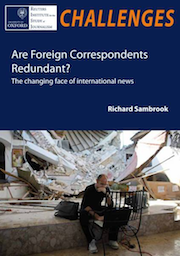 Are foreign correspondents redundant?
Are foreign correspondents redundant?
Our friends across the pond, at Oxford’s Reuters Institute for the Study of Journalism, ask that provocative question in a report they released this morning: a rigorous study of a globalized (er, globalised) ecosystem of news.
“All news organisations are undergoing turbulent change and must ask where the risks and the opportunities are,” the report notes. “And against this background, where does the primary public interest rest in ‘bearing witness’?”
If you’re at all interested in the changing shape of global journalism — and, in particular, the effect of technology’s sources-go-direct empowerment of world citizens on the news landscape — then I highly recommend reading the report in its entirety. It’s long, but worth it: It’s chock full of illustrative state-of-the-landscape overviews, personal anecdotes, and economic analyses, all placed in helpful historical context. (Plus, it’s written by Richard Sambrook, currently of Edelman and formerly of the BBC, one of the smartest thinkers you’ll find on the effects of globalization on news production and consumption.)
So: read it! In the meantime, though, here are a few highlights:
The days of information centralization may be over.
“The model of a foreign correspondent, working from a fixed overseas bureau, is well established across all forms of international newsgathering – newspapers, wire agencies, broadcasters. It is a feature which grew from the industrialisation of news production in the late nineteenth century, when a limited number of organisations had sufficient resources to gather and distribute news, with owners seeking the prestige and influence that reporting international events brings.
“However, here was news from abroad before there were correspondents and bureaux. And we are now entering a new era where they may no longer be central to how we learn about the world. A wide range of pressures are undermining the role of foreign correspondent and providing opportunities – and imperatives – for news organisations to adopt a very different approach to reporting international news.”
The downward spiral in the amount of foreign news coverage we’re familiar with in the U.S. is primarily a Western phenomenon.
“In Asia, with the prospect of major economic growth, news organisations may be set for an era of expansion. And in the developing world countries and continents are building their own journalistic capacity – with long-term consequences for the global flow of information and the character of public debate.”
Social media help reporting…but can also hurt it.
“Social media are leading, supplementing and complementing what professional news organisations offer, providing fresh source material for reporters, but also competing with them for public attention. Many other organisations have taken the opportunity to contribute directly to public debate by introducing their own information services – from governments, to NGOs to commercial companies – speaking directly to the public in favour of their own interests. This challenges the capacities of news organisations to sort, verify and contextualise a torrent of digital information.”
Globalization helps reporting…but can also hurt it.
“Globalisation has also led to significant changes in how the world is reported. In multicultural societies the notion of ‘foreign’ is more complex. International and domestic news agendas have merged to a significant degree. More organisations are relying on local staff – with advantages and risks attached.”
All this would seem to suggest that the real title of the report, rather than “Are Foreign Correspondents Redundant?”, might have been: “Are Foreign Correspondents Obsolete?” But the answer in either case would be no. This isn’t a matter of extinction, Sambrook concludes; it’s a matter of evolution. “Are foreign correspondents redundant? By no means,” he writes. “But they will be very different from their predecessors and work in very different ways to serve the digital news environment of the twenty-first century.”